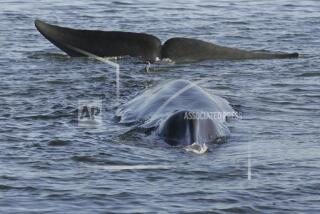Japan Gives Hunters OK to Kill 30% More Whales
- Share via
WASHINGTON — Japan has increased by roughly 30% the number of whales it will allow its hunters to kill this winter in restricted seas around Antarctica, and President Clinton is expected to issue what aides describe as a strong complaint today.
But, in a move that angers environmentalists, he has decided not to impose trade sanctions on Japan or to threaten such a step, administration officials said.
The president’s course has prompted a sharp debate among aides in the Council on Environmental Quality and the National Oceanic and Atmospheric Administration, and environmental activists outside the administration.
The issue links three sensitive concerns within the Clinton White House--the environment, trade and politics--to America’s often-difficult relationship with Japan.
The Commerce Department put the issue on Clinton’s agenda by determining two months ago that Japan’s whaling in the farthest reaches of the south seas diminishes “the effectiveness of the International Whaling Commission conservation programs.”
The dispute has put Clinton in a difficult place politically.
By not taking a harsher stand, he opens himself to criticism from environmentalists--a key element in the traditional Democratic coalition--who want sanctions imposed and from political opponents who say he has not been effective in previous trade disputes with Japan.
The restrictions on whaling in about 8 million square miles around Antarctica protect more than 90% of the world’s whales, which feed in large numbers there. The sanctuary, approved by the International Whaling Commission on May 26, 1994, with only Japan voting against it, was created to give depleted whale populations what amounted to a recovery zone.
A Japanese Embassy official specializing in fisheries issues, Joji Morishita, said the Japanese government has given its whaling fleet permission to kill from 360 to 440 minke whales in the region during the current season, the southern hemisphere’s summer. In 1995, he said, the quota was 270 to 330 whales.
Morishita said the harvest is permitted under International Whaling Commission regulations governing what is known as “scientific” whaling, conducted to allow research, and that it is necessary to kill the whales to determine their age, health and diet. Once a whale is killed for such purposes, he said, international regulations require that the meat be sold at market--where, according to the World Wildlife Fund, it can fetch as much as $200 a pound.
Clinton had been urged by environmental groups to initiate high-level talks with the Japanese to make it clear that the United States won’t tolerate any whale harvest in the Antarctica region and to set a date for Japan to reduce its harvest.
The issue has begun to attract attention in Congress, with a group of Democrats and moderate Republicans writing to Clinton on Wednesday urging him, if Japan does not retreat, “to impose economic sanctions against Japan for undermining the effectiveness of an international conservation agreement.”
“Japan’s actions are particularly egregious in light of the fact that the International Whaling Commission’s Scientific Committee has repeatedly found Japan’s ‘scientific’ whaling to be of no scientific value,” they wrote.
But an administration trade expert, speaking on the condition of anonymity, said the White House does not have enough evidence to challenge Japan’s assertion that it is killing the whales for scientific purposes, rather than just for sale, and that the administration feels that sanctions would not be “very productive.”
“We consider very carefully before we put that arrow on our bowstring,” the official said.
More to Read
Sign up for Essential California
The most important California stories and recommendations in your inbox every morning.
You may occasionally receive promotional content from the Los Angeles Times.













